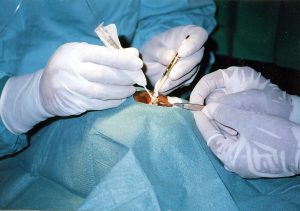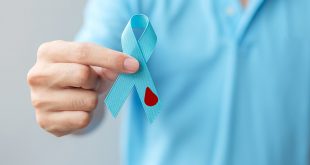Lesions of the surrounding organs: urinary (ureter, bladder, urethra), genitals (seminal vesicles, prostate, ovaries, uterus, vagina) and vascular. Other, rarer lesions may occur (intestine, pancreas). They are often favored by the size and aggressiveness of the tumor and by tissue changes secondary to radiation therapy.
Urinary repairs may require placement of a ureteral prosthesis (JJ catheter) as a guide to healing, and sometimes prolonged maintenance of the bladder catheter.
Hemorrhages:
It can occur during the procedure and cause the surgeon to modify the course of the operation to control it. Transfusions may be necessary.
Nerve compression:
The surgical and anesthetic team systematically checks the correct positioning of the limbs in order to avoid any compression of the nerves or soft parts during the operation (especially if it is long).
Post-operative complications:
Short term:
They are quite frequent due to the complexity of the intervention, concern one in three patients and are most of the time quickly identified and treated effectively
Bowel obstruction:
Refeeding is gradual but rapid and will be associated with early mobilization (getting up and walking). The healthcare team supporting you will help you. Otherwise, it may be necessary to stop feeding or even insert a nasogastric tube to aspirate stomach contents and relieve the bowel (until transit resumes). If a mechanical obstruction is diagnosed (obstruction on the intestine), revision surgery may be necessary with the help of laparatomy surgery instrument set.
Anastomotic fistula:
Usually occurs in the first 7 postoperative days. The major risk is the appearance of an abscess or peritonitis, the severity of which is limited by the presence of a protective stoma.
Its treatment may consist of drainage (radiological or surgical), and antibiotic therapy. Rarely should a surgical revision be necessary to perform cleaning, drainage and fecal bypass if it was not performed initially. In the most severe cases, removal of the anastomosis may be performed. The quality of the nutritional intake is essential in these situations.
Loco regional infection:
Mainly at the surgical site (scar or in the abdomen)
Depending on its type (superficial / deep) and its severity, several treatments are possible: antibiotics, radiological puncture, drainage surgery and daily nursing care.
Complications of the perineum:
In the case of a PAA, the main risk is infection and disunity of the perineal wound in 30 to 40% of cases. Several types of pro-healing care exist and the quality of the nutritional intake is also essential.
Stomal complications:
Skin lesions (chemical burns induced by the stool) especially in case of diversion on the small intestine (liquid stools), obstructions, intussusception, prolapse. They are even less frequent when the patients have been taken care of by an ostomy therapist. They may require treatment and rarely surgical revision.
Venous thrombosis (phlebitis, pulmonary embolism):
They may occur despite any precautions taken (compression stockings, preventive anticoagulation, resumption of ambulation, physiotherapy, etc.) requiring prolonged curative anticoagulant treatment.
Urinary complications:
A bladder or delayed resumption of voiding may require prolonged maintenance of the bladder catheter. A urinary tract infection is possible.
For more details, please visit: jimymedical.co.uk
 Universal Bloggers
Universal Bloggers




